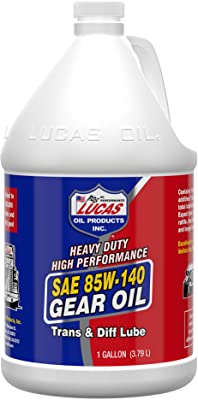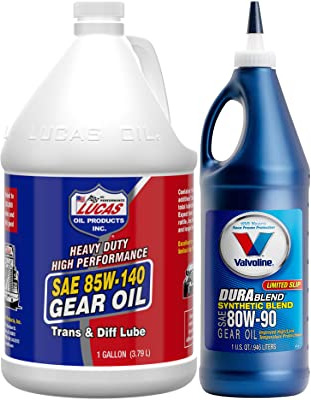The 85w140 vs. 80w90 gear oils Main differences, the 85w140 has a lesser viscosity index than the 80w90, which makes it more liquid-like and less thickness to it. However, overall both the gear oils are pretty similar but they do serve different purposes when it comes to general use. Other differences would be the kinematic viscosity, the pour point, and also its general recommended vehicles.
Although the technical differences are quite noticeable in some cases, both of these gear oils are set to meet their objectives abroad. And again, this would mean that you have to spend on these processes. Let us see more clearly in the table through some comparison of 85w140 vs. 80w90.
| Product | 85w140 gear oil | 80w90 gear oil |
| Brands | These oils generally come with the branding of Mobilube. | Along with other products, Valvoline produces the best gear oils In general. |
| Definition | The 85w140 gear oil is a high-performance, crude gear oil. | 80w90 gear oils are general and naturally usable gear oils. |
| Viscosity index | It has a viscosity index of 99. | A viscosity index of 110 can be found. |
| Kinematic viscosity | At a temperature of 40 degrees Celsius, the kinematic viscosity of 133 mm/s can be found. | At the temperature of 40 degrees Celsius a kinematic viscosity of 122.2 mm/s can be found all over. |
| Pour point | At the temperature of 40 degrees Celsius, a kinematic viscosity of 122.2 mm/s can be found all over. | -30 degrees Celsius is the lowest temperature for these gear oils to pour. |
| Suitable vehicles | In terms of vehicles, it is good for heavy trucks, vans, and buses. | It is great for general vehicles of low to medium volume. |
What Is 85w140?

In brief, the 85w140 gear oil is a high-performance, strong gear oil. They are exclusively made from general base oils, which helps their effectiveness a lot. These gear oils can provide you with a smooth and healthy service when it comes to heavier, more power-absorbing vehicles. They can also very well handle extremely difficult conditions in terms of temperature and absorb shock and high towing loads. Overall, they have great thermal stability and viscosity.
What Is 80w90?

The 80w90 are more general, middleweight gear oils. These work as lubrication for your gearbox and also reduce water. Overall the viscosity and index are well over the line and they can also be operated well under the pressure of low torque, high stock load, and such challenges. The general sturdiness and temperature handling of the gear oil help its overall score and rating by a large consideration.
The 85w140 Vs 80w90 Gear Oils: Major Differences
Viscosity Index
Generally, fuels tend to change in nature with respect to time and the environment around them. In general terms, the lower the Viscosity index the more effect it has on its surroundings. Overall this point is crucial as it might intend to affect the fuel economy of your vehicle. In this case, the 85w140 gear oil has a lower viscosity index than the 80w90, which stands at 110. Though lower viscosity is easier to pour in lower temperatures and a higher viscosity provides a thick, aging gear oil.
Kinematic viscosity
From a hypothetical point of view in measuring and comparing the viscosity of an oil, the kinematic viscosity idea comes into play. In brief, the absolute Viscosity of oil at any given and fixed temperature is called a kinematic viscosity index. In these terms, at the given temperature of 40 degrees Celsius, the 85w140 and the 80w90 have a kinematic viscosity of 133 and 122.2 mm per second.
Pour point
In general, words, the pour point is the lowest temperature that a gear oil or any oil, in general, can maintain its liquidity. As a result of extremely low temperatures, oils may freeze or become hard depending on the temperature and the pour point of course, which makes it unusable. So pour point in gear oils can prove to be a great feature if you are a victim of extreme temperatures. In this case, the 85w140 has a pour point of negative 18 degrees Celsius and the 80w90 goes even lower to negative 30 degrees Celsius.
Compatible vehicles
Though gear oils can be used in preferable cars and vehicles, some gurus like to suggest compatible cars and trucks that can bring the most out of your gear oil. In this case, the 85w140 is great for both heavy trucks, while the 80w90 gear oils are better shaped for general cars for everyday use.
Mentioning features
Out of the technical features, the two gear oils also offer other great features. At a glance, both these oils are fully synthetic formulas, meet both the GL5 and the MT1 requirements, and are both conveniently anticorrosion and anti-oxidation oils, which helps a lot regarding the durability of the gear oils.
85w140 Is Best for Heavy Load Trucks
Even though these gear oils can handle other vehicles well, the 85w140 gear oil is best if you want a gear oil for heavier vehicles. The features such as the viscosity, pour point, and so on make for a unique, sturdy oil that will do the deed for your trucks and vans.
80w90 Is Best for General Vehicles
Overall, the pour point of the 80w90 gear oil has pushed its limits, granting usability even lower than other high-performance gear oils. These oils however will be the best for your general SUV and daily use cars such as lightweight Toyota, Honda, and so on. With all its features combined, it grants a light, and smooth oil overall.
Final Thought
At the end of the day no matter how much technicality a product has, the game ends on what you desire. If you want a strong and sturdy gear oil for your GMC or other trucks the 85w140 will work for you. But if you are looking for light and general use for your vehicle, then the 80w90 gear oil will serve your purpose. But of course, look into the compatibility of the oil with your vehicle.
Read also:

